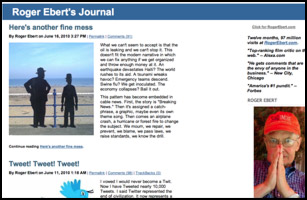
Since the mid-2000s, Roger Ebert has been unable to eat or speak, following complications from cancer surgery. Thus Roger Ebert's Journal — not to mention his Twitter feed — has become a space for the film critic to discuss a mosaic of topics beyond the movie theater. He muses about quantum physics and the economic crisis, he ruminates on the newspaper business's glory days, and he savages the Texas bureaucrats who don't want Darwin taught in schools. He has also written extensively — and bravely — about his medical problems, detailing how his writing has improved since he lost his voice and how blogging has replaced the role of dinner conversation in his life, offering the sort of communal back-and-forth that he misses. His readers and followers have responded in kind, flooding his posts with appreciative, analytical and argumentative replies. The irony, of course, is that even though Ebert lost his ability to verbally communicate, never before has he been so accessible to his fans or engaged so colorfully in the conversation of the day. For his growing legion of readers around the world, Roger Ebert's Journal is a place to read and react, and to let your imagination run wild. It might as well be dubbed Roger Ebert's Dinner Table.